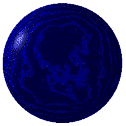

The Nucleus is the brains of the cell.
Purpose
The nucleus controls the actions inside of the cell.
Function
The nucleus is the brain of the cell. It contains the DNA and RNA of the cell, which work together to build and control the cell. It produces proteins, which are carried by the endoplasmic reticulum to the various parts of the cell. These proteins are messages which give the cell orders.
Like the mitochondria and chloroplasts, the nucleus is a small little cell within a cell. It has a double membrane, contains DNA, and manufactures proteins. However, unlike those other two organelles, the nucleus' proteins and DNA direct the rest of the cell.
The membrane surrounding the nucleus is called the nuclear membrane. The "stuff" inside of the nucleus (besides the nucleolus) is called the nucleoplasm. Inside of the nucleus is is a round shape called the nucleoulus. Made up of proteins and RNA, the nucleolus helps in the formation of ribosome's.
Location
The nucleus is inside the cell membrane.
Number
There are one per cell in most eukaryotes except in some muscle cells have two. They are not present in most prokaryotes.